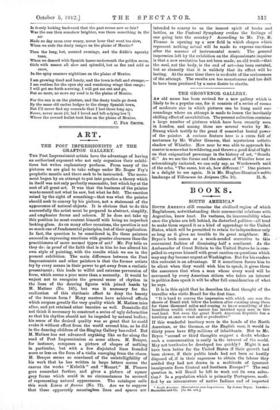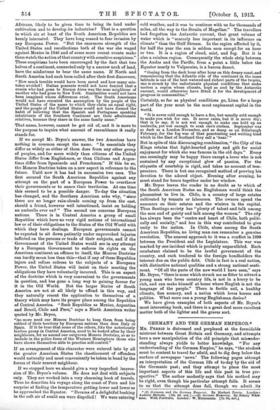BOOKS.
SOUTH AMERICA.• SOUTH AMERICA. still remains the civilized region of which Englishmen, notwithstanding their commercial relations with Argentina, know least. Its vastness, its inaccessibility when once the plains are left behind, its disturbed politics—all tend to make them regard it as a kind of appendage to the United States, which will be permitted to retain its independence only so long as it gives no trouble to its great neighbour. Mr. Bryce's book comes as a much-needed corrective to this convenient fashion of dismissing half a continent. As the Ambassador of Great Britain to the United States he is com- pelled to express himself with great caution on questions which may any day become urgent at Washington. But for his readers this restraint is an advantage. If it sometimes forces him to be silent when they would wish him to speak, it gives them the assurance that when a man whose every word will be canvassed by every American citizen who takes an interest in politics does speak it will be after full consideration of what be says.
It is in this spirit that he describes the first thought of the traveller who visits Brazil for the first time.
" It is hard to convey the impression with which one sees the shores of Brazil sink below the horizon after coasting along them for three thousand miles and coming to know something of tho boundless wealth which nature has lavished upon man in this vast land. Not even the great North American Republic has a territory at once so vast and so productive."
If this wonderful territory were in the hands of the North American, or the German, or the English race, it would in thirty years have fifty millions of inhabitants. But to Mr. Bryce "second or third thoughts suggest a doubt whether such a consummation is really in the interest of the world. May not territories be developed too quickly ? Might it not have been better for the United States if their growth had been slower, if their public lands had not been so hastily disposed of, if in their eagerness to obtain the labour they needed they had not drawn in a multitude of ignorant immigrants from Central and Southern Europe ? " The real question is, will Brazil be left to work out its own salva- tion ? Is a population which is primarily Portuguese, modi-
fied by an intermixture of native Indians and of imported
• South Asi..riaa : Obsersalutts and Impressicas. By James Bryce. London: Macmillan and Co. [So. Gd. net.)
Africans, likely to be given time to bring its land under cultivation and to develop its industries ? That is a question in which six at least of the South American Republics are keenly interested. They have long ceased to fear invasion by any European Power. "But the enormous strength of the United States and recollections both of the war she waged against Mexico in 1846 and of some more recent events make them watch the action of that country with sensitive suspicions." These suspicions have been encouraged by the fact that two halves of a continent, connected only by a narrow neck of land, have the misfortune to bear the same name. If North and South America had each been called after their first discoverer,
"How much trouble would have been saved and how many mis- takes avoided ! Italian peasants would not have fancied that a cousin who had gone to Buenos Aires was the near neighbour of another who had gone to New York. Similarities would not have been imagined where differences exist. The South Americans would not have resented the assumption by the people of the United States of the name to which they claim an equal right, and the people of the United States would not have formed the habit of believing that the Spanish and Portuguese speaking inhabitants of the Southern Continent are their affectionate relatives, because they share in the same family name."
That name, however, cannot be got rid of, and it is more to the purpose to inquire what amount of resemblance it really
stands for.
If we accept Mr. Bryce'a answer, the two Americas have nothing in common except the name. "In essentials they differ as widely as either of them does from any other group of peoples, and far more widely than citizens of the United States differ from Englishmen, or than Chilians and Argen- tines differ from Spaniards and Frenchmen." If this be so, the Monroe Doctrine takes on a new aspect in reference to the future. Until now it has had in succession two uses. The first secured the South American Republics against any attempt on the part of a European Power to overthrow their governments or to annex their territories. At one time this seemed to be a. possible danger. To-day the situation has changed, and the Southern American asks why, " since there are no longer rain-clouds coming up from the east, should a friend, however well intentioned, insist on holding an umbrella over us? " The second use concerns European nations. There is in Central America a group of small Republics which have no very rigid notions of international law or of their obligations to the States of the Old World with which they have dealings. European governments cannot be expected to sit down patiently under unprovoked injuries inflicted on the persons or trade of their subjects, and if the Government of the United States would see in any attempt by a European Government to enforce its rights on the American continent an offence to itself, the Monroe Doctrine can hardly mean less than this—that if any of these Republics injure and refuse redress to the subjects of a European Power, the United States will insist on their meeting the obligations they have voluntarily incurred. This is an aspect of the doctrine which is very convenient to the governments in question, and has gone a long way to gaining favour for it in the Old World. But the larger States of South America are not at all likely to offend in this way, and they naturally resent the application to themselves of a theory which may have its proper place among the Republics of Central America. " Such Republics as Mexico, Argentina and Brazil, Chile and Peru," says a North American writer quoted by Mr. Bryce,
":no more need our Monroe Doctrine to keep them from being robbed of their territory by European nations than does Italy or Spain. If it be true that some of the others, like the notoriously lawless group in Central America, need to be looked after by their neighbours, let us amend our outgrown Monroe Doctrine, so as to include in the police force of the Western Hemisphere those who have shown themselves able to practise self-control."
If an arrangement of this character were entered into by all the greater American States the chastisement of offenders would naturally and most conveniently be taken in hand by the forces of their nearest neighbour.
If we stopped here we should give a very imperfect impres- sion of Mr. Bryce's volume. He does not deal with subjects only. They are worked into a very charming book of travels.
Thus he describes his voyage along the coast of Peru and his surprise at finding the temperature getting lower and lower as he approached the Equator. "Dreams of a delightful basking
in the soft air of sunlit sea were dispelled We were entering
cold weather, and it was to continue with us for thousands of miles, all the way to the Straits of Magellan." The travellers bad forgotten the Antarctic current, that great volume of water which is "scarcely less important in its influence on climate " than the Gulf Stream. In the region affected by it, for half the year the sun is seldom seen except for an hour or two. It is a region of cloud, mist, and fog. But it is also a rainless region. Consequently the whole strip between the Andes and the Pacific, from a point a little below the Equator nearly to Valparaiso, is a barren desert.
"Gazing from the deck hour after hour on this dreary coast, and remembering that the Atlantic side of the continent in the same latitude is one of the best watered and richest parts of the tropics, one is struck by the unfortunate physical conditions that make useless a region whose climate, kept so cool by tho Antarctic current, would otherwise have fitted it for the development of progress in communities."
Certainly, so far as physical conditions go, Lima for a large
part of the year must be the most unpleasant capital in the world.
"It is never cold enough to have a fire, but usually cold enough to make you wish for one. It never rains, but it is never dry; that is to say, it is not wet enough to make one hold up an umbrella, yet wet enough to soak one's clothes. September was as dark as a London November, and as damp as an Edinburgh February, for the fog was of that penetrating and wetting kind which in the East of Scotland they call a hear. "
But in spite of this discouraging combination, "the City of the Kings retains that light-hearted gaiety and gift for social enjoyment for which she was famous in the old days." Every one seemingly may be happy there except a lover who is not sustained by any exceptional glow of passion. For the etiquette of courtship is rigid, and takes no account of tem- perature. There is but one recognized method of proving his devotion to the adored object. Evening after evening, he must stand for hours together under her window.
Mr. Bryce leaves the reader in no doubt as to which of the South American States an Englishman would think the pleasantest to live in. Chile, is a country of large estates cultivated by tenants or labourers. The owners spend the summers on their estates and the winters in the capital. Thus Santiago society has "plenty of talent and talk among the men and of gaiety and talk among the women." The city has always been the " centre and heart of Chile, both politi- cally and socially," and has in this way contributed to give unity to the nation. In Chile, alone among the South American Republics, no living man can remember a genuine revolution. The nearest approach to it was a conflict in 1890 between the President and the Legislature. This war was marked by one incident which is probably unparalleled. Each combatant claimed to be the lawful government of the country, and each tendered to the foreign bondholders the interest due on the public debt. Chile in fact is a real nation, with distinctive national qualities and a strong national senti- ment. "Of all the parts of the new world I have seen," says Mr. Bryce, " there is none which struck me as fitter to attract a young man who loves country life, is not in a hurry to be rich, and can make himself at home where English is not the language of the people." There is fertile soil, a healthy climate, fine scenery, and a nation which loves horses and politics. What more can a young Englishman desire ?
We have given examples of both aspects of Mr. Bryce's most interesting book, and there is a great deal more excellent matter both of the lighter and the graver sort.



































































 Previous page
Previous page